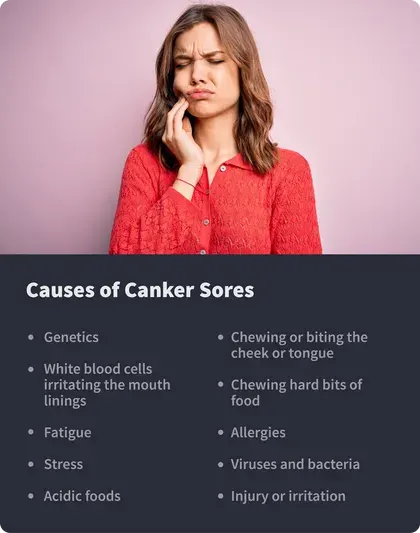Canker Sores - Causes, Symptoms and Treatment

Table of Contents
- What Are Canker Sores?
- Causes
- Are Canker Sores Contagious?
- Risk Factors
- Symptoms
- Treatment Options
- Prevention
- References
Canker sores are white and reddish ulcers that form on the mucous membrane around the mouth, including the gums and inside the upper and lower lips.
These mouth ulcers, or aphthous ulcers, vary in dimension. They can be as small as a BB and sometimes can grow to the size of a dime. Multiple sores can develop at the same time.
Although these sores generally do not bleed unless they’re aggravated by a toothbrush, they’re sensitive and painful to the touch regardless of size. Canker sores are not contagious, and they usually go away within two weeks.
Causes of Canker Sores

Canker sores have no known exact cause, although researchers believe a variety of factors trigger them. And each person’s triggers are unique.
These are some of the conditions that seem to play a role in canker sore development:
Genetics (family history of having them)
White blood cells irritating the mouth linings
Fatigue
Stress (physical and emotional)
Acidic foods
Chewing or biting the cheek or tongue
Chewing hard bits of food
Allergies
Viruses and bacteria
Injury or irritation
If you are prone to canker sores, you may want to consider tracking your symptoms. When you notice your next canker sore, write down its location and size, and add any details about what’s going on in your life at the time.
Pertinent details include the following:
What you have been eating and drinking the week before the sore appeared
A list of medications you are taking
Your stress level on a scale of 1 to 10
Over time, you may notice one or two commonalities every time a canker sore develops. If one of the constants is specific to your diet, you may want to see an allergist to see if you are allergic to specific foods. If the constant is stress, consider integrating some mindfulness exercises or meditation into your daily routine.
Are Canker Sores Contagious?
No, canker sores are not contagious. They are not caused by the herpes virus or any other STD. They cannot be spread through kissing, sharing food, or sexual contact.
Canker sores do look similar to cold sores and other mouth blisters that may be contagious. Be cautious when coming into contact with someone with visible sores.
If you are worried that your mouth sores may not be canker sores but instead contagious cold sores or sores from another condition, seek medical attention in order to avoid spreading the sores or worrying unnecessarily.
Are Some People More Prone to Canker Sores than Others?
The short answer is yes, although like so much about these nagging sores, there’s more anecdotal and experiential evidence than medical research to back up this idea.
Most people who get these sores first start dealing with them around age 10. In addition, women are more likely to develop canker sores than men, although doctors have yet to pinpoint why.
It’s important to note that canker sores are not cold sores. Like canker sores, cold sores can develop inside the mouth, but they typically appear outside the mouth. Cold sores that form outside the mouth (on the lips) are much more likely to be contagious.
So far, there does not appear to be a link between people who get cold sores and canker sores.
Canker sores are typically less than 1 mm but can enlarge to ½ to 1 inch in diameter.
Symptoms of canker sores
When sores appear, these red or white bumps tend to cause irritation and pain. This pain usually lasts a couple days. The healing process can take anywhere from 5 to 15 days. Unfortunately, they are likely to occur many times a year.
Canker sores can form in groups or by themselves. But there are some factors that might warrant a person contacting their dentist. If you have any of the following symptoms, it is recommended to get a professional assessment:
Severe pain
Frequent canker sores
Fever
Fatigue
Difficulty eating or swallowing
Treatment Options
Unfortunately, nothing can get rid of canker sores forever. Treatments focus on managing the pain and discomfort and making the condition tolerable until the sores run their course.
The most prevalent treatments are antiseptic medications, numbing gels, vitamins, and a diet with little or no hot spices.
These include the following:
Hydrogen peroxide diluted in water
Saltwater mixed with baking soda
Wet tea bags
You can rinse with either mixture, or apply a wet tea bag directly to the sore.
When you have a canker sore, numbing gels make life better for short periods of time. You can purchase these mouth-specific gels over the counter at your local drugstore. Apply the gel directly on the sore from the tube or with a moist cotton swab.
If you constantly deal with mouth sores, ask your medical provider for a prescription for a lidocaine rinse or rub. Lidocaine will numb the sore for a longer period of time than store-bought gels will.
Sometimes your body lacks certain vitamins, and you may want to add one or more supplements to your diet, such as these:
Iron
Folic acid
Vitamin B12
You can get any of these supplements at your drug store or a local health food store. They’re also readily available at online retailers.
Spicy foods are not considered a cause of canker sores, but they can make an already painful sore even more uncomfortable. When you have a sore in your mouth, refrain from eating wasabi, buffalo sauce, tabasco sauce, red chili peppers, jalapeno and habanero peppers, and other heat-producing spices.
Preventing Canker Sores
Because canker sores have no documented or specific cause, there’s no foolproof method of prevention. Once you build a case history of your sores, you can make some decisions — and ask questions of your doctor or dentist — about what you can do to avoid developing more of these painful sores.
